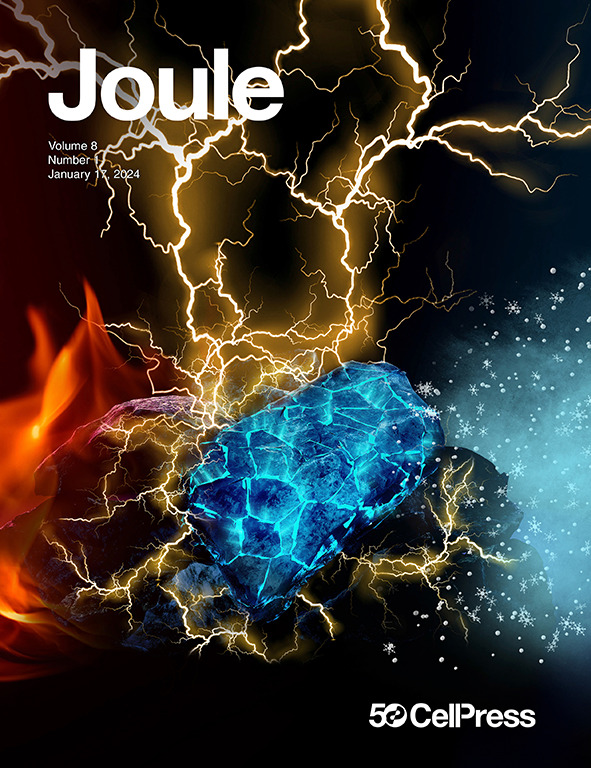Unveiling the thermite-driven lithium fire ignition in solid-state batteries
IF 35.4
1区 材料科学
Q1 CHEMISTRY, PHYSICAL
引用次数: 0
Abstract
This study challenges the assumption of the non-flammability of lithium metal all-solid-state batteries (LiSSBs) and other lithium metal batteries without flammable electrolytes. Through thermodynamic calculations and ex situ experiments, we reveal for the first time the risk of thermite reactions between lithium metal and LiFePO4 in both charged and discharged states. Reactivity is worsened by excess lithium metal in the cell, reaching final maximum adiabatic temperatures of 2,500°C in the charged state, which is hot enough to boil lithium. The thermite reaction triggers spontaneously at 500°C, with poor surface contact, while increasing surface contact through mixing initiates the reaction at room temperature in an inert environment. Despite its fast kinetics, this reaction is transport limited due to lithium passivation, leading to long burn times and reignition risks. Given the risk of lithium metal contacting the cathode during failure, understanding these reactions is crucial for ensuring the safe deployment of LiSSBs.


揭开固态电池中铝热剂驱动的锂点火的面纱
这项研究挑战了锂金属全固态电池(lissb)和其他不含可燃电解质的锂金属电池的不可燃性假设。通过热力学计算和非原位实验,首次揭示了在充电和放电状态下金属锂与LiFePO4发生铝热反应的危险性。电池中过量的锂金属会使反应性恶化,在带电状态下达到最终最高绝热温度2500°C,这个温度足以使锂沸腾。铝热剂反应在500℃时自发触发,表面接触差,而通过混合增加表面接触在室温下惰性环境下启动反应。尽管反应速度快,但由于锂钝化,该反应的输运受到限制,导致燃烧时间长,有重燃风险。考虑到锂金属在故障期间接触阴极的风险,了解这些反应对于确保lissb的安全部署至关重要。
本文章由计算机程序翻译,如有差异,请以英文原文为准。
求助全文
约1分钟内获得全文
求助全文
来源期刊

Joule
Energy-General Energy
CiteScore
53.10
自引率
2.00%
发文量
198
期刊介绍:
Joule is a sister journal to Cell that focuses on research, analysis, and ideas related to sustainable energy. It aims to address the global challenge of the need for more sustainable energy solutions. Joule is a forward-looking journal that bridges disciplines and scales of energy research. It connects researchers and analysts working on scientific, technical, economic, policy, and social challenges related to sustainable energy. The journal covers a wide range of energy research, from fundamental laboratory studies on energy conversion and storage to global-level analysis. Joule aims to highlight and amplify the implications, challenges, and opportunities of novel energy research for different groups in the field.
 求助内容:
求助内容: 应助结果提醒方式:
应助结果提醒方式:


